Innocence and Vulnerability
INTRODUCTION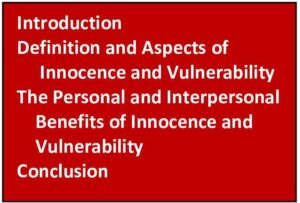
Innocence and vulnerability can be a daily part of our life and can make profound contributions to the satisfaction that we experience in life. Innocence was part of our personality when we were little. The innocence of a newborn, toddler, and young child is legendary. But what about innocence through the rest of the life cycle, (adolescence, adulthood, being a senior and an elder)? Is it important or useful to have innocence? We will address this question. Is vulnerability of any value? The answer is yes and we will explore why. Innocence and vulnerability have been defined and seen as undesirable, as something we don’t want and should avoid. Innocence is foolish naivete. Vulnerability is weakness. This is unfortunate as we will explore the positives and desirability of innocence and vulnerability.
In this Letter we introduce theoretical ideas. In the next Letter we describe ways to put theory into practice.
DEFINITION AND ASPECTS OF INNOCENCE AND VULNERABILITY
Point of Empowerment: As we explore innocence and vulnerability let’s keep in mind that they exist within the context of relationship, our relationship with our self and our relationship with other people.
Our life is made up of experiences. Our experiences can come from outside ourselves, external experiences, or from inside ourselves, internal experiences. Innocence is experiencing things for the first time and responding spontaneously to the experience. A child’s life is filled with first experiences and they respond spontaneously to them. They cannot help being innocent because of their lack of experience. Adults also have many first experiences in addition to repeating experiences. But adults immediately scan their memories of the past to see if the current experience is like a past experience. Our reactions and responses are then colored by our past experience. Constructively, we may apply what we have learned. Or we limit our experiencing by assuming that the present is like the past, miss the differences, and respond with preprogrammed behavior.
Vulnerability is being open and unguarded as we approach experience, both external and internal experiences. Vulnerability is a boundary issue concerning the boundaries between ourselves and other people and between internal aspects of ourself. A boundary is a barrier. An open boundary lets things pass into our self and into our awareness as we are relaxed and unguarded. A closed boundary blocks entrance. The part of ourself that manages our boundaries is our ego. A healthy ego maintains a flexible boundary that is open, partially open, or closed as appropriate to the situation. There are many degrees of openness or closedness. We open our boundary with a “yes” and close our boundary with a “no.” We may not say yes or no explicitly but approach situations with a yes or no attitude. Both yes and no are necessary and when used appropriately according to the situation we interact with life in an effective and rewarding way. Children are vulnerable because of their innocence. They don’t initially close up and guard themselves but lean how and when to do this. Innocence and vulnerability work together. Adults can’t be innocent without being vulnerable because innocence requires the openness of vulnerability. But adults can be vulnerable without being innocent.
In addition to saying “no,” our ego uses “ego defenses” to guard our boundaries. These defenses come in small, medium, and large sizes and seem necessary at times. But the effects of these defenses are to block out, limit, or dilute our life experience. Using the ego defenses of denial and projection for example, we may feel attacked by criticism about our behavior even though it is constructive, in our best interest. We respond with denial saying, “No I did not do that,” and then with projection saying, “You are the one who did that.” But when we are unguarded, vulnerable, we allow ourselves to fully feel the impact of our experiences no matter how painful they may be.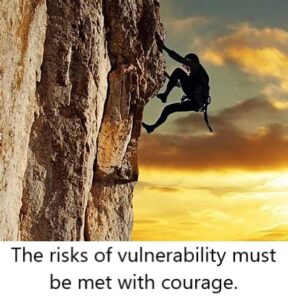
Another aspect of vulnerability is that we open to our “soft underbelly,” the aspects of our self that can get hurt, that we are not proud of, are embarrassed by, or are ashamed of. We allow other people to see these aspects of ourselves. We want to see them clearly. This visibility makes us susceptible to getting hurt and humiliated by other people and to hurting ourselves with our own self judgement. By being vulnerable we may open ourselves to being attacked and need to know how to constructively respond to an attack should it come our way. Also, our vulnerability opens the way for us to be self-accepting.
Point of Empowerment: As adults, since we have had the experience of feeling pain and hurt, we need courage in order to cultivate the vulnerability necessary to stay open.
Point of Empowerment: Vulnerability may open us to painful experiences but in doing so it creates opportunities for growth.
Innocence is spontaneously responding to experience but our responses may be spontaneous or deliberate depending on circumstances and our choices. Both spontaneous and deliberate responses are necessary. Spontaneous and deliberate actions are influenced by guardedness and vulnerability. Spontaneous behavior occurs in the moment without control or censorship. We feel relaxed. If we are guarded, refusing to be vulnerable, our responses will be predominantly deliberate. They are controlled and designed to protect us from attack, even imaginary attack. (We include ego defenses as deliberate responses.) Deliberate responses may feel necessary but there are situations where spontaneity may be a more rewarding response. If we are unguarded, vulnerable, we can respond spontaneously because we allow our thoughts, feelings, impulses, and behavior to flow uncensored, unblocked. For example, a friend makes a funny joke about us. If we feel attacked we become guarded and defensive possibly attacking back. If we are unguarded and vulnerable we can laugh at the joke even though it may be at our expense.
Point of Empowerment: Our spontaneous behavior may be effective or ineffective but with spontaneous behavior we have opened a door to new experiences and to new understandings.
Another aspect of vulnerability is being open to and aware of our strengths and good qualities. We need to recognize our strengths and good qualities even though we may hide them from others. We hide our strengths and good qualities for various reasons, fearing jealousy and attack for example. We may also hide them because we feel that we cannot live up to the expectations we have created for ourselves about what our strengths and good qualities ask of us, to always be kind and loving for example. Yet our strengths and good qualities are aspects of ourselves that we can be proud of and use to the greatest extent possible for our benefit and the benefit of others.
THE PERSONAL AND INTERPERSONAL BENEFITS OF INNOCENCE AND VULNERABILTIY
There are benefits of innocence and vulnerability that pertain mainly to our internal experience of ourselves. And there are benefits of innocence and vulnerability that are experienced through and in our interpersonal relationships.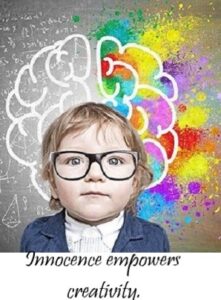
The first personal benefit is that innocence invites creativity. To be able to respond spontaneously to a new experience, we must be creative. We create a new response. To be creative we need our imagination because our imagination creates the new in our life. Innocence empowers our creativity by opening and connecting us to our imagination. Our first response to a new experience is to imagine what it is like since we don’t have a memory of the experience. Our response to an experience becomes part of our memory of that experience.
If our response is a spontaneous response, created by our imagination, part of the memory of that experience is therefore created by our imagination. (Actually, since our ability to perceive is limited there are “blanks” in our perception of any experience. We “fill in the blanks,” add details, with our imagination to have a “complete and logical” memory of an experience. Let us understand that imaginary details become part of the memory of any given experience. This is part of the reason that people present at the same event have different memories of that event. In understanding this we can approach our memories with some objectivity and relaxation.)
Innocence uses our imagination to plan and create new experiences. For example, let’s say that it is our first day of kindergarten and we are looking forward to making new friends. We are experiencing making friends with new people for the first time. We are learning what it means to make friends. Since we are new to friendship, we use our imagination to think about what friendship might be and to think about who we would want to be friends with. We then choose someone to approach as we seek friendship and we respond to someone who approaches us in a friendly way. Or we are considering going to the movies. If we add innocence to our thinking we can look for ways to make this a new experience beyond simply seeing a movie. If it is comedy for example, we can look for new aspects of our sense of humor.
Point of Empowerment: Our creativity and imagination flourish in an environment of innocence.
Point of Empowerment: Since part of a memory is created by our imagination, we can be less rigid and more flexible when we work with our memories for problem resolution and personal growth.
Vulnerability is necessary for innocence as it opens boundaries allowing the spontaneous flow of our internal processes. If we are not vulnerable and open but guarded against parts of ourselves, we cannot experience the flow of our internal processes because we have set up barriers. In addition, if we shut down vulnerability we shut down spontaneity and we don’t have the spontaneity necessary to react to new experiences with innocence. For example, I am looking for a new romantic relationship and need to respond with spontaneous innocence when I meet a new person. If I put up guards against my feelings I won’t know who I like and who I should seek a future with.
The barriers to our internal experience that prevent us from being innocent and vulnerable also keep us from using our ability to be creative and imaginative because these barriers inhibit flow. But these barriers inhibit the use of our abilities in general. Consider fear as a barrier. Fear results in avoidance, a guard against the thing that causes us fear. For example, we may fear our strength and then inhibit the use our strength to assert ourself, to advocate for ourself when it is necessary. We are not vulnerable with our strength. The fear may be a fear of admitting to ourselves and to others how strong we are because we think that we cannot live up to an expectation that we must be strong all the time. The fear of our strength may also come from a potential to act destructively. If we act destructively our strength will increase the power of that action. If we don’t want to act destructively we fear the strength that would increase our destructiveness. To overcome these fears we need to recognize and resolve them.
Self-knowledge requires innocence and vulnerability. We can only know ourselves if we are vulnerable with ourself, if our internal boundaries are relaxed and open. If we hide aspects of ourself behind barriers we will not know or experience those aspects of ourself. For example, I have an ability to write poetry but I think this is not a manly thing to do. As I ignore and even deny this ability, I miss the enjoyment and knowledge of this aspect of myself. In seeking self-knowledge we can use innocence to act as if we are meeting ourself for the first time and can take a new look at ourself. We don’t make assumptions about ourselves but open to new self-awareness and understanding.
We often block awareness of parts of ourselves that we think are unacceptable. This is the ego’s road to self-acceptance—denial, pretend that these parts of us do not exist. We repress the awareness of these parts banishing them to our unconscious where they create havoc, influencing us in ways that we cannot see. Underneath these “unacceptable” aspects of ourself are abilities that we need to recover. For example, I think that my anger is unacceptable, am afraid of my anger, and suppress and repress it banning it from my awareness. However, anger contains power. We see how powerful we can be when we are angry. Also, we may express thoughts and “truths” that we fear to express except when we are angry. Without our anger we restrict our ability to be powerful and our ability to express ourself.
Point of Empowerment: Without the awareness of all aspects of ourself we limit our self-knowledge, limit our ability to change and grow, and limit our ability to deal effectively with the world.
Vulnerability, innocence, and presence. With presence we bring our full awareness and all the aspects of ourselves to the present moment. If we live in the present moment we are fully engaged with life. All our senses (touch, taste, seeing, hearing, and smelling) are fully alive with sensation. We are open to all our thoughts, feelings, and to the experiences that come our way. The degree that we are fully present is the degree that we are powerful and able to create what we want in our life. If we want to experience happiness and joy we must be present.
To be present we need to be innocent and vulnerable. As we have been discussing, awareness and using all aspects of our self are enhanced and empowered by innocence and vulnerability. We make all aspects of ourselves available to use and experience in the present moment. Our innocence helps us experience each moment as new, engaging, and exciting. If we do not stamp our past onto the present moment we are open to experiencing its novelty and therefore its fullness and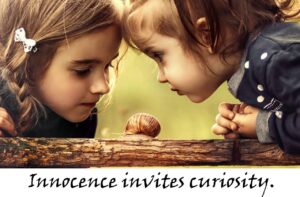 richness.
richness.
Point of Empowerment: Being present can be very challenging as we are easily distracted by irrelevant thoughts and by our to-do lists. But we see the great value of presence and strive to bring it into our life as often as possible.
Point of Empowerment: Being in the now of experience can be challenging because we often experience pain, which we want to avoid. As we avoid pain we may be avoiding the now of our life where there is also great pleasure.
Point of Empowerment: Along with presence, innocence brings curiosity, our ability to be curious about the newness of each moment of living.
CONCLUSION
In this Letter we have been exploring the definitions and benefits of innocence and vulnerability. By understanding what innocence and vulnerability are and by seeing their benefits we have discovered their value and their potential for enriching our life. In the next letter we will continue our exploration, beginning with more ideas about personal and interpersonal intimacy. This will lead us into a discussion of vulnerability and love. We will also explore ways to increase our practice of innocence and vulnerability.
